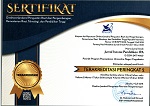Keefektivan Pendekatan Contextual Teaching and Learning (CTL) untuk Meningkatkan Kemampuan Berpikir Kritis dan Rasa Ingn Tahu Mahasiswa
Abstract
Keywords
Full Text:
PDFReferences
Hake, R. R. 1999, Analyzing Change/ Gain Score. American Educational Research Methodology. Online. http://lists.asu. edu/cgibin/wa?A2=ind9903&L=aerad&P=R6855. diakses tanggal 10 Januari 2017.
Johnson, E. B. 2002. Contextual Teaching And Learning. Tousand Oaks. California. Corwin Press.
Putri, Maharani Ardi dan Meinarno, Eko A. 2018. Relevankah Pancasila dan Globalisasi? Mengungkap Hubungan Pancasila dan Identitas Global. Jurnal Ilmiah Pendidikan Pancasila dan Kewarganegaraan. (Online), Volume 3, Nomor 1, Halaman 78-80, Juni 2018 (http://journal2.um.ac.id/index.php/ jppk/article/view/6044/3099, diakses pada 17 Maret 2019).
Rowson, J. 2012. The Power Of Curiosity. London. RSA Sosial Brain Centre.
Shamsid-Deen, I & Bettye P.S. 2006. Contextual teaching and learning practices in the family and consumer sciences curriculum. Journal of Family and Consumer Sciences Education, Volume 24 Nomor 1, Hal. 14-27.
Schmitt, F. F. & Lahroodi, R. 2008. The epistemic value of curiosity. Journal Educational Theory. Volume 58 Nomor 2. 125-148.
United Nations Development Programme. 2016. Human Development Report 2016. http://hdr.undp.org/sites/default/ files/2016_human_development_report. pdf, diakses tanggal 10 Mei 2018.
Utami, Prihma Sinta. 2017. Persepsi Mahasiswa terhadap Pendidikan Moral Siswa. Jurnal Ilmiah Pendidikan Pancasila dan Kewarganegaraan. (Online), Volume 2, Nomor 1, Halaman 48-53, Juni 2017 (http://journal2. um.ac.id/index.php/jppk/article/ view/2513/1536, diakses pada 27 April 2019).
Zuss, M, 2008, The Practice Of Theoretical Curiosity, New York, Springer
DOI: http://dx.doi.org/10.17977/um019v4i1p169-175
Refbacks
- There are currently no refbacks.
Copyright (c) 2019 Jurnal Ilmiah Pendidikan Pancasila dan Kewarganegaraan

This work is licensed under a Creative Commons Attribution 4.0 International License.
View My Stats










